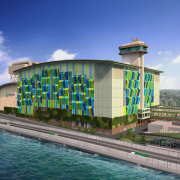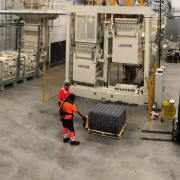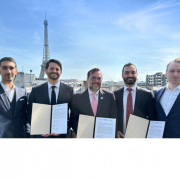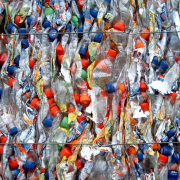Opportunities in Africa
According to Indian market research company Mordor Intelligence, the African waste management market is set to grow.
As stated in 2022, prior to the 27th United Nations Conference of Parties (COP27), the African market size was estimated at 21.72 billion US-Dollar in 2024, and was expected to grow until 2029 at a CAGR (composed annual growth rate) of nearly five percent. Over the course of the years, the market would reach 27.70 billion US-Dollar, the company predicted. “The market is driven by government initiatives and projects.” Furthermore, it was driven by the companies emerging in the sector to increase recycling needs.
Africa’s urban population is growing fast: 3.5 percent per year. Although waste generation in Africa is currently lower than in the developed world, “SubSaharan Africa is expected to overtake the developed world as the dominant region in terms of total waste generation if current generation trends continue”. Population growth, rapid urbanization, a growing middle class, changing consumption habits and production patterns, and global waste trade and trafficking would contribute to waste generation in Africa. “Inadequate waste management in Africa is causing economic, social, and environmental problems. However, there are some encouraging signs.”
According to the market research company, with an average of 57 percent of MSW (Municipal Solid Waste) being biodegradable organic waste, the bulk of waste is dumped, typically in uncontrolled and controlled dumpsites. Only about four percent of the waste is recycled, often by informal actors (as with reuse). “Africa has lately become a dumping site for waste, particularly hazardous waste, often from developed countries,” Mordor Intelligence gave account. “More than 130 people have died in landfill collapses in Africa in the past year, 2/3 of whom were women. To address these concerns, many social and technological innovations have emerged in the waste sector in Africa.”
In comparison to the continent’s low recycling rate, South Africa would stand out as a “shining beacon”. In 2021, the country consumed approximately 3.4 million tons of packaging (glass, paper, metal, and plastic), with approximately 54 percent collected for recycling.
Increasing awareness towards the waste management
“One of the most significant decisions in the history of waste management in Africa was taken when African environment ministers gathered in Senegal in the middle of September 2022,” Mordor Intelligence informed. “The ministers started the process of putting an end to open rubbish burning and dumping. This choice will have a variety of effects on the economy, the environment, and society. Millions of lives could be saved across the continent.”
The market research firm identified waste management initiatives as the most urgently needed investment for climate infrastructure in African towns. “Among all projects that were disclosed, waste management projects ranked first (50 projects, or 27 percent of the total), followed by water management (28 projects, or 15.5 percent), transportation (27 projects, or 15 percent), renewable energy (25 projects, or 14 percent), and buildings (ten percent and five percent, respectively), with a total of 29 projects.” 50 waste management projects totaling 935 million US-Dollar in value and more than 356 million US-Dollar in investment were reported by 31 local governments. “The key initiatives were phasing out open dump sites, building sanitary landfills, and redirecting trash from landfills to more sustainable waste recovery and treatment methods,” Mordor Intelligence reported. mordorintelligence.com/industry-reports/africa-waste-management-market
Financier: The Africa Circular Economy Facility
The Africa Circular Economy Facility (ACEF) – which became operational in 2022 for an initial five-year period – is a multi-donor grants trust fund hosted by the Climate Change and Green Growth Department of the African Development Bank. “Its objective is mainstreaming the circular economy as an inclusive green growth strategy to help African nations fulfill their development priorities while meeting the goals of the Paris Agreement, Sustainable Development Goals (SDGs) and the African Union’s Agenda 2063,” the African bank group informs on the organization’s homepage. “ACEF supports the creation of institutional frameworks to foster the circular economy and provides private sector support for the circular transition. It is funded by the Ministry of Foreign Affairs of Finland and the Nordic Development Fund.” Furthermore, ACEF is working toward scaling its activities and becoming a leading financier of the circular transition in Africa.
According to an information leaflet published by the African Development Bank Group’s Department of Climate Change & Green Growth, in 2023, ACEF supported national circular economy policy roadmaps and strengthened capacity to design policies that create an enabling environment for the circular economy. A multi-country project was implemented to help four countries to develop their national circular economy roadmap. In addition, fora and trainings for peer exchange between governments were created. Also in 2023, the Africa Circular Economy Facility supported the implementation of business development programs by providing technical assistance to start-ups and small grants to eligible SMEs through financial intermediaries.
Finally, yet importantly, ACEF fostered the African Circular Economy Alliance (ACEA) and its secretariat in creating a pool of circular economy champions and encouraging partnerships and knowledge sharing on the African continent and beyond. “Support is provided for African engagement on global and regional circular economy fora such as the World Circular Economy Forum (WCEF).“
https://www.afdb.org/sites/default/files/2023/05/12/acef_brochure_-_e_version_.pdf
(Published in GLOBAL RECYCLING Magazine 1/2024, Page 3, Photo: El Grincho / pixabay.com)









